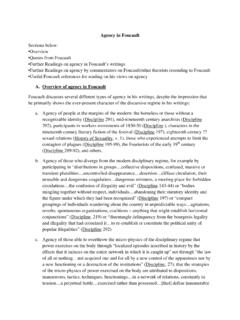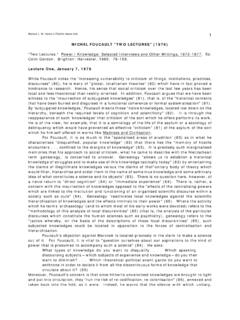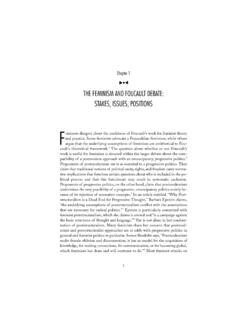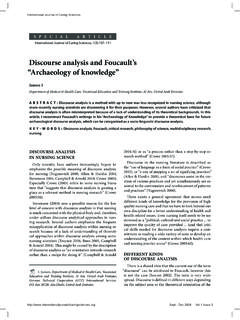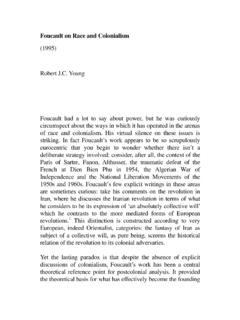Transcription of ebooksclub.org Power Knowledge Selected Interviews and ...
1 Power / Knowledge Selected Interviews and other Writings 1972-1977 Michel foucault Edited by COLIN GORDON Translated by COLIN GORDON, LEO MARSHALL JOHN MEPHAM, KATE SOPER a Pantheon Books, New York Copyright 1972, 1975, 1976, 1977 by Michel foucault Preface and Afterword Copyright 1980 by Colin Gordon Bibliography Copyright 1980 by Colin Gordon This collection Copyright 1980 by The Harvester Press All rights reserved under International and Pan-American Copyright Conventions. Published in the United States by Pantheon Books, a division of Random House, Inc., New York, and simultaneously in Canada by Random House of Canada Limited, Toronto.
2 Originally published in Great Britain by The Harvester Press, Limited. LIBRARY OF CONGRESS CATALOGING IN PUBLICATION DATA foucault , Michel. Power Iknowledge. Bibliography: p. 1. Power (Social sciences) I. Gordon, Colin. II. Title. '3 79-3308 ISBN 0-394-51357-6 ISBN 0-394-73954-x (pbk.) Manufactured in the United States of America 40 39 38 37 36 35 34 33 32 31 CONTENTS page Preface vii Translations and Sources xi 1 On Popular Justice: A Discussion with Maoists 1 2 Prison Talk 37 3 Body/ Power 55 4 Questions on Geography 63 5 Two Lectures 78 6 Truth and Power 109 7 Power and Strategies 134 8 The Eye of Power 146 9 The Politics of Health in the Eighteenth Century 166 10 The History of Sexuality 183 11 The Confession of the Flesh 194 Afterword 229 Bibliography 261 3 BODY/ Power Interviewers: editorial collective of Quel Corps?
3 You depict in Discipline and Punish a political system where the King's body plays an essential role .. In a society like that of the seventeenth century, the King's body wasn't a metaphor, but a political reality. Its physical presence was necessary for the functioning of the monarchy. And what about the Republic, 'one and indivisible'? That's a formula that was imposed against the Girondins and the idea of an American-style federalism. But it never opetated in the same manner as the King's body under the monarchy. On the contrary, it's the body of society which becomes the new principle in the nineteenth century.
4 It is this social body which needs to be protected, in a quasi-medical sense. In place of the rituals that served to restore the corporal integrity of the monarch, remedies and therapeutic devices are employed such as the segregation of the sick, the monitoring of contagions, the exclusion of delinquents. The elimination of hostile elements by the supp/ice (public torture and execution) is thus replaced by the method of asepsis-criminology, eugenics and the quarantining of 'degenerates' .. Is there a fantasy body corresponding to different types of institution? I believe the great fantasy is the idea of a social body constituted by the universality of wills.
5 Now the phenom-enon of the social body is the effect not of a consensus but of the materiality of Power operating on the very bodies of individuals. The eighteenth century is usually seen under the aspect of liberation. You describe it as the period when a 56 Power / Knowledge network of forms of control (quadrillage) is set in place. Is the liberation possible without the quadrillage? As always with relations of Power , one is faced with complex phenomena which don't obey the Hegelian form of the dialectic. Mastery and awareness of one's own body can be acquired only through the effect of an investment of Power in the body: gymnastics, exercises, muscle-building, nudism, glorification of the body beautiful.
6 All of this belongs to the pathway leading to the desire of one's own body, by way of the insistent, persistent, meticulous work of Power on the bodies of children or soldiers, the healthy bodies. But once Power produces this effect, there in-evitably emerge the responding claims and affirmations, those of one's own body against Power , of health against the economic system, of pleasure against the moral norms of sexuality, marriage, decency. Suddenly, what had made Power strong becomes used to attack it. Power , after investing itself in the body, finds itself exposed to a counter-attack in that same body.
7 Do you recall the panic of the institutions of the social body, the doctors and politicians, at the idea of non-legalised cohabitation (l'union fibre) or free abortion? But the impression that Power weakens and vacillates here is in fact mistaken; Power can retreat here, re-organise its forces, invest itself elsewhere .. and so the battle continues. Would this account for the much-discussed 'recuper-ation' of the body through pornography and advertising? I don't agree at all with this talk about 'recuperation'. What's taking place is the usual strategic development of a struggle.
8 Let's take a precise example, that of auto-eroticism. The restrictions on masturbation hardly start in Europe until the eighteenth century. Suddenly, a panic-theme appears: an appalling sickness develops in the Western world. Children masturbate. Via the medium of families, though not at their initiative, a system of control of sexuality, an objectivisation of sexuality allied to corporal persecution, is established over the bodies of children. But sexuality, through thus becoming an object of analysis and concern, surveillance and control, engenders at the same Body/ Power 57 time an intensification of each individual's desire, for, in and over his body.
9 The body thus became the issue of a conflict between parents and children, the child and the instances of control. The revolt of the sexual body is the reverse effect of this encroachment. What is the response on the side of Power ? An economic (and perhaps also ideological) exploitation of eroticisation, from sun-tan products to pornographic films. Responding precisely to the revolt of the body, we find a new mode of investment which presents itself no longer in the form of control by repression but that of control by stimulation. 'Get undressed-but be slim, good-looking, tanned!
10 ' For each move by one adversary, there is an answering one by the other . But this isn't a 'recuperation' in the Leftists' sense. One has to recognise the indefiniteness of the struggle-though this is not to say it won't some day have an end .. Doesn't a new revolutionary strategy for taking Power have to proceed via a new definition of the politics of the body? The emergence of the problem of the body and its growing urgency have come about through the unfolding of a political struggle. Whether this is a revolutionary struggle, I don't know. One can say that what has happened since 1968, and arguably what made 1968 possible, is something pro-foundly anti-Marxist.



